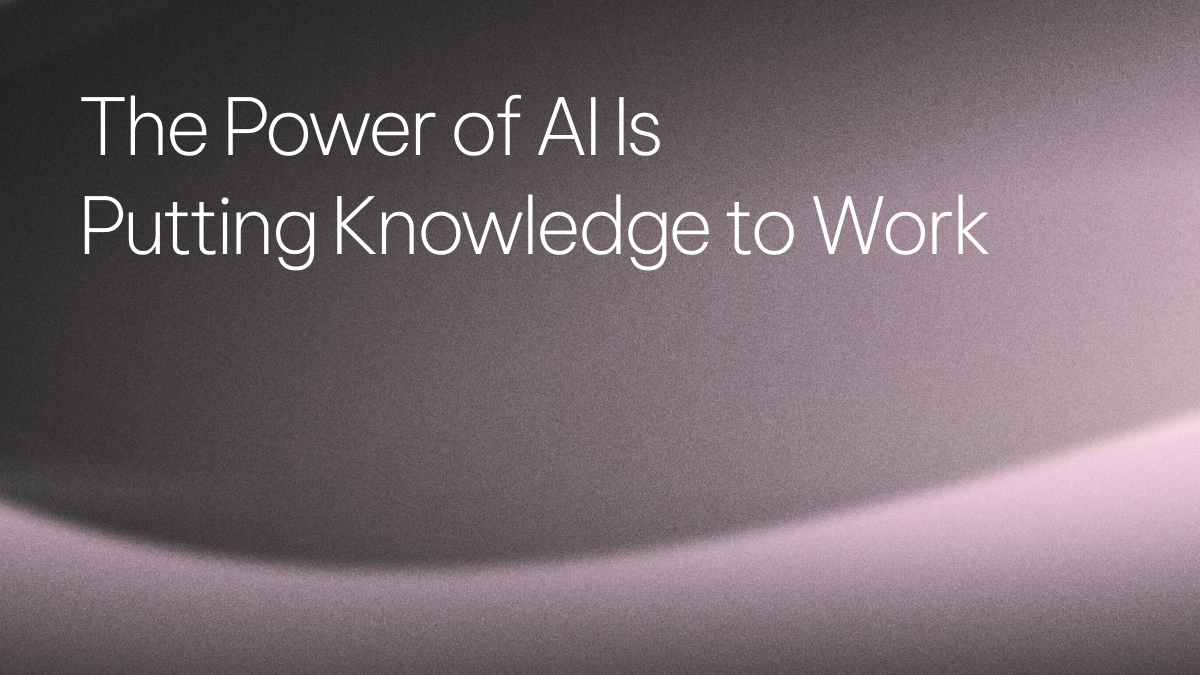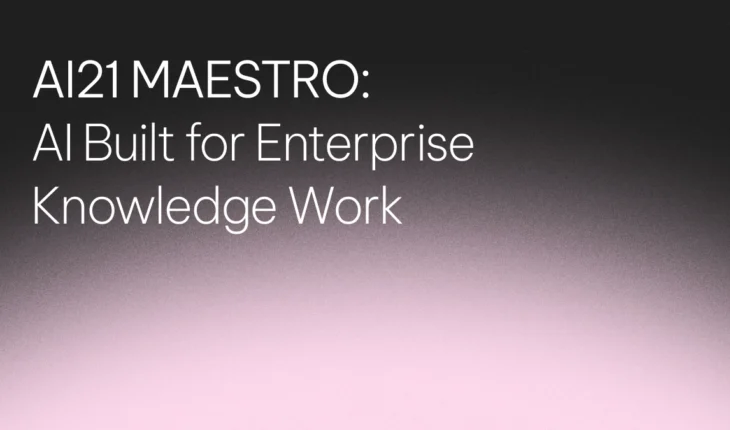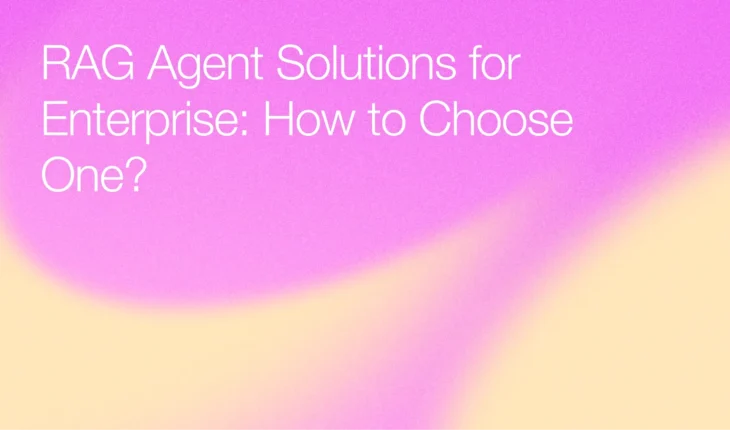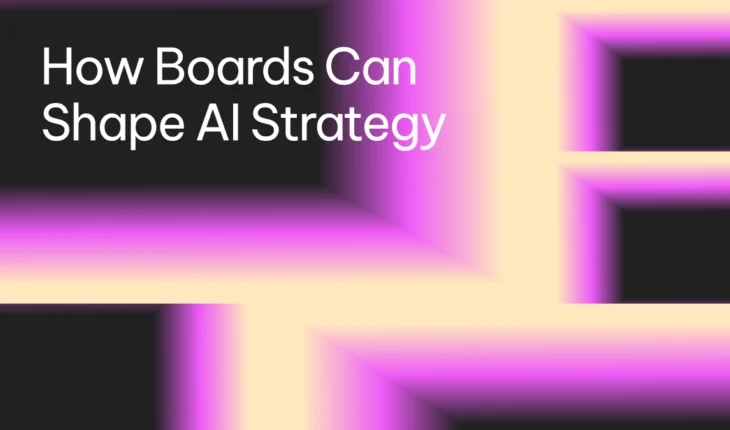Table of Contents

The Power of AI Is Putting Knowledge to Work
Enterprise leaders have been overwhelmed with hype about autonomous AI agents revolutionizing business. Major vendors are touting “agentic AI” systems that can supposedly handle complex tasks with minimal human input. Yet on the ground, true adoption of AI agents in enterprises is stalling. In fact, Gartner predicts that over 40% of AI agent projects will be canceled by 2027 due to soaring costs and unclear value1. Despite rising investments, most deployments remain stuck in pilot mode, delivering little real ROI. The reality simply hasn’t matched the promise.
Why are so many enterprise AI agent initiatives faltering? It’s not because the idea is flawed, but because current approaches are targeting the wrong problems. Many efforts have been caught up in building agent frameworks, tool integrations, or flexible pipelines—without getting clear on where the real value lies.
Where the Real Value Lies: Knowledge Work—Not Just Knowledge Retrieval
The word “agent” already implies that the work is cognitive in nature. But too often, what’s being built are glorified retrieval wrappers—basic RAG chatbots that answer questions by pulling up snippets from documentation. These systems can be useful, but they’re not doing knowledge work. They’re doing knowledge lookup.
And that’s the distinction we must get sharper about.
The real opportunity isn’t in helping a support rep get a snippet from a policy document. It’s in automating the kind of work that today only a trained, context-aware human knowledge worker can do—work that involves retrieving information from multiple sources, reasoning through ambiguities, making judgments, synthesizing evidence, and ultimately producing structured, high-value outputs like a report, summary, or recommendation.
Peter Drucker coined the term knowledge work in the 1950s to describe this class of work: where the core task is to think, analyze, and produce with information. In the 1950s, only around 15% of workers fit that category. Today, that number is upwards of 70% in modern economies. And yet, most of the automation we’ve seen—AI-based or otherwise—still centers around physical tasks or rote administrative processes.
If AI agents are to become core to enterprise operations, they must be built for knowledge work at enterprise scale. That means handling high-stakes, multi-step tasks—like producing an M&A diligence summary, a strategic vendor evaluation report, or a compliance risk report—not just answering FAQs or querying a database.
This is where generative AI is meant to shine—not just because it understands language, but because it can generate and evaluate ideas, perform reasoning, and interface fluently with the tools and formats that knowledge work depends on. But despite all the promise, this transformation has yet to materialize in practice.
Why Isn’t This Happening?
1. Errors Multiply with Every Step
The first barrier is reliability across multiple reasoning steps. Knowledge work isn’t one-shot—it’s a sequence of actions, often with dependencies and evolving instructions. But today’s agents still rely on probabilistic models that lose coherence over long chains. A single misinterpretation or hallucination early on can snowball into outputs that are incomplete or flat-out wrong.
This is well documented in research: LLM performance decays as task length increases, and most existing frameworks offer little in the way of runtime self-correction. In short, agents that try to “figure it out as they go” often go astray.
2. They Lack the Right Context—and the Ability to Use It
Even more limiting is the absence of enterprise-specific context. Performing high-value knowledge work in a business environment requires understanding where to find information, how to navigate a workflow, what’s relevant to the task, and how to decide between multiple possible approaches.
This is not the kind of context that out-of-the-box LLMs “know” and not the type you can simply fit into a prompt.
Take the example of a team preparing a major customer proposal. A human analyst knows where past proposals live, which ones are similar, which success metrics matter to this specific client, and how to adjust the messaging based on internal pricing policies or previous win-loss analysis. They also carry organizational memory—understanding how similar deals have evolved, what messaging resonated in past negotiations, and which approaches the company has moved away from and why. Today’s agents don’t know any of this unless it is explicitly encoded—often manually—into the prompt or code. They lack this institutional knowledge and learning from experience. They don’t know where to look, why certain inputs matter more than others, or how to tailor outputs to organizational norms.
This is the current ceiling: agents can retrieve facts, but they can’t yet execute workflows that require judgment, synthesis, and planning with live, proprietary enterprise knowledge.
The Real Opportunity: Trustworthy Agents for Complex Knowledge Work
Imagine what’s possible if we could trust AI agents to perform high-stakes knowledge work end to end.
Example 1: End-to-End M&A Due Diligence
A corporate development team needs to evaluate an acquisition target. The process involves reading through contracts, NDAs, board decks, financial models, cap tables, and regulatory filings. It requires extracting key terms, identifying inconsistencies, generating a data request list, performing financial ratio analysis, and summarizing risks.
Today, this takes a team of analysts and days of manual effort. With the right agent, the entire pipeline could be handled autonomously—from document ingestion and information extraction, to synthesis and report generation. What once took a week could be completed in under an hour, with full auditability and traceability of every step.
Example 2: Drafting an AI Regulation Compliance Memo
A legal team is asked to assess whether a new internal AI system complies with the latest EU AI Act provisions. This requires reviewing documentation about the system’s capabilities, cross-referencing it with legal obligations, identifying potential non-compliance areas, and drafting a memo that summarizes findings and recommended mitigations.
A knowledge agent built for this task would first locate and extract relevant details about the system, retrieve up-to-date regulatory guidelines, run comparative analysis, and produce a structured, legally accurate recommendation memo—freeing the legal team to focus on edge cases, not groundwork.
In both cases, the value isn’t in retrieving the right snippet. It’s in doing the work: navigating the workflow, evaluating the information, and delivering a product with structure, rationale, and relevance. That’s the frontier we need to reach.
The Way Forward — AI21 Maestro
At AI21, we’ve spent the last year focused on one question: What would it take to build agents you can actually trust with enterprise-grade knowledge work?
Today, we’re proud to introduce AI21 Maestro, now available to enterprise customers.
Maestro is a system for building and deploying knowledge agents – AI systems purpose-built to perform multi-step reasoning and synthesis across company-specific data. It’s designed not to guess at the next step like typical agents, but to methodically plan and execute complex workflows: choosing the right retrieval strategies, validating intermediate results, and producing structured, accurate outputs.
Unlike generic agent frameworks that leave planning to chance or require months of hardcoded logic, Maestro dynamically plans each task, balances tradeoffs like cost and latency, and self-corrects as it works—producing clear, transparent outputs that you can trace and trust.
And unlike simple RAG pipelines, Maestro doesn’t stop at retrieval. It performs the full arc of knowledge work: breaking down a goal, identifying what information is needed, retrieving it, interpreting it, and composing a coherent, valuable result—whether that’s a diligence memo, a compliance summary, or a multi-page research document.
We believe this is what agents were always meant to be: not vague chat interfaces, but systems that can do actual work in enterprise environments. Work that requires precision, structure, and reasoning.
With AI21 Maestro, that future is no longer theoretical.
Learn more and book a demo of AI21 Maestro.



